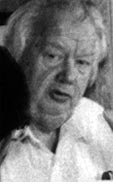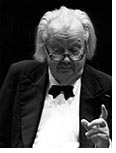| |
|
|
 |
|
|
 

|
ENCOUNTERING SÁNDOR VÉGH
It was an important date for me. I was scheduled to play Bartók’s Second Violin Concert at a Music Event. Two weeks previously, I heard about a Master Class to be held by Sándor Végh in Salzburg and promptly appeared there the next morning. I found him in the Mozartheum, in a hall overflowing with students. Upon entering, he saw me, the newcomer, and asked what business I was traveling in.
“I would like to audition, if you have time for me”. “Of course”, he replied, “but you will have to wait till the lesson is over”. Afterwards he listened to me playing the A major Violin Concert of Mozart to the end without interrupting once. Then he wondered hitting his forehead, “Man, where have you been hiding so long”?
I told him about my background: schools, travels, my job as orchestra leader of several years at the Klagenfurt Opera orchestra. His answer was that, on principle, he does not teach orchestra members because he, being an egoist, expects results from his teaching and full commitment of time from his pupils to reach that goal. “But”, he added, I willmake an exception in your case”. He went on to explain that there is no such thing as a Miracle Teacher. No teacher is suitable for every pupil and vice versa. On the other hand, there are Miracle Pupils. He recommended that I show up in Salzburg two or three days, not just to get the benefit of a lesson but also learn from the classes given to other students whose problems might often be similar to mine, and learn by comparison.
Thus began my most agreeable period of study, lasting four years and a half, in which I learned an incredible lot and was richly rewarded. When after the frist lesson, I asked what his fee was, he said: “You cannot pay that”, and that was it. Looking back now, all I can say is that my gratitude is the only thing I can give in return.
Beyond the classes, too, it was my privilege to spend time with him in Salzburg. After breakfast we would go to the Mozartheum where I, as an irregular student , I would perform before the students.
The lessons were hard and tiring, in the tradition of the old Hungarian school. Sándor Végh kept saying that I man of talents ought to stand this – or else quit studying. After having lunch with me at his home he would take a short nap, then we would go on working right there before the afternoon classes in the Mozartheum.
The hours spent together had the greatest significance for me. The sparkling conversation between him and his wife Alice and his most interesting stories freed me from much of the inhibitions accompanying my admiration. After such hours I was bursting with new thoughts and ideas.
We had many things in common. Based on their profound linguistic knowledge, we had long talks about the old Sumerian language which occupied me a lot in those times. Végh also found my documentary films very interesting which I had made about the old Hungarian Transsylvania. We both had our roots there: He was born in Kolozsvár (today: Cluj). And through my grandmother I have many relatives in Erdély (Transsylvania). I had traveled extensively in that region and documented the indigenous customs.
The true folklore there particularly impressed him. Above all its variety, variability, and honest emotion expressing itself in these Arts. All those artifacts, earthenware burnt and painted, wood carvings, or embroidery, were for him pieces of art, unique and not to be found elsewhere. Along this route, he returned music, also an art that calls for utmost variability and richness in nuances. We both also appreciated the beauty of musical instruments and cultivated the art of recognizing their origin based on publications of the trade. Referring to his predilection for violin bows, he called himself a bow bigamist.
As time went by, our respective families developed a deep and clear friendship. Es specially memorable for us were the summer invitations to Cervo an the Mediterranian See. Equally satisfying was to host the Véghs for a few days at our place in Ebenthal. It was rewarding to see the quiet in our house soothing him when he was seeking relaxation after times of hard work.
On the other hand, his thirst for new realms was irrepressible. Thus, we visited the famous sights, historical and otherwise, of Carinthia and even the neighboring Slowenia. He greatly appreciated the beauty of the Carinthian landscape and nature’s magic.
When touring the famous lakes, Végh honored the memory of Brahms in Leonstain and also took a look at Mahler’s house.
We shall always remember his happy nature, his good mood, his laugh at good jokes, and his spirited tales. Ever since I have met him no day has passed without me thinking about his words. I could play well only when I imagined him standing before me and wondered how it would sound if he were playing it.
It was very exiting to watch him play, in class or in concert. And often there was an urge to applaud his admirable solutions. When reaching for his Stradivari he seemed transformed. As if heavenly rays were pointed at him. His suggestive power was overwhelming, at times like the caress of a woman’s hand, at times like the crack of a whip.
The lovely soulful sound always spoke as if telling a tale. He found that all the Italian Sonatas would begin as if telling about times long past. Then, with intensity steadily increasing, the present gains dominance.
His faultless, astonishing technique was not an end in itself. He gave even Paganini a pensive depth. Time and again we admired his incredible memory. Whenever somebody come up with something new he was able to repeat it right away, be it etude or concert piece. The musical idea was the measure of all things, and all problems should be approached from the musical side. Technical solutions must serve the music with no exception. Here, he would not tolerate any compromise. To find the right way, he recommended looking for analogies in other pieces.
By his all-embracing knowledge he managed to link our play to times past. We became late descendants of the French violin tradition (Hubay, Vieuxtemps, to Rode and Beriot) and come in a position to revive a playing style almost forgotten.
One can state with all confidence: “If Pablo Casals was the Master of the Cello Bow, Végh was the same for the violin bow.” |
| |
|
|
|
|
|
|
|
|
|
|
|
Mag. Attila Szabó - Oremusstraße 2, 9020 Klagenfurt, Austria |
|
|
